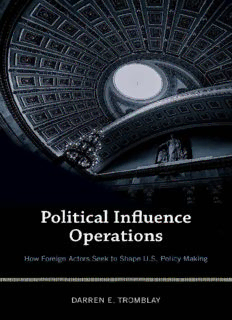
Political Influence Operations: How Foreign Actors Seek to Shape U.S. Policy Making PDF
Preview Political Influence Operations: How Foreign Actors Seek to Shape U.S. Policy Making
Political Influence Operations Political Influence Operations How Foreign Actors Seek to Shape U.S. Policy Making Darren E. Tromblay ROWMAN & LITTLEFIELD Lanham • Boulder • New York • London Executive Editor: Traci Crowell Assistant Editor: Mary Malley Senior Marketing Manager: Amy Whitaker Credits and acknowledgments for material borrowed from other sources, and reproduced with permission, appear on the appropriate page within the text. Published by Rowman & Littlefield A wholly owned subsidiary of The Rowman & Littlefield Publishing Group, Inc. 4501 Forbes Boulevard, Suite 200, Lanham, Maryland 20706 www.rowman.com Unit A, Whitacre Mews, 26–34 Stannary Street, London SE11 4AB, United Kingdom Copyright © 2018 by Darren E. Tromblay All rights reserved. No part of this book may be reproduced in any form or by any electronic or mechanical means, including information storage and retrieval systems, without written permission from the publisher, except by a reviewer who may quote passages in a review. British Library Cataloguing in Publication Information Available Library of Congress Cataloging-in-Publication Data Names: Tromblay, Darren E, author. Title: Political influence operations : how foreign actors seek to shape U.S. policy making / Darren E. Tromblay. Description: Lanham, Maryland : Rowman & Littlefield, [2017] | Includes bibliographical references. Identifiers: LCCN 2017059803 (print) | LCCN 2018001871 (ebook) | ISBN 9781538103326 (electronic) | ISBN 9781538103302 (cloth : alk. paper) | ISBN 9781538103319 (pbk. : alk. paper) Subjects: LCSH: Foreign agents—United States. | Political planning— United States. | United States—Politics and government—Decision making. Classification: LCC JZ1450 (ebook) | LCC JZ1450 .T76 2018 (print) | DDC 320.60973—dc23 LC record available at https://lccn.loc.gov/2017059803 The paper used in this publication meets the minimum requirements of American National Standard for Information Sciences—Permanence of Paper for Printed Library Materials, ANSI/NISO Z39.48–1992. Printed in the United States of America For the cast of characters who comprise and complement the 11:30 choir at Holy Trinity Catholic Church in Georgetown and for my mother who instilled a love of knowledge that has served me well. The views expressed in this book are solely those of the author and do not represent the position of any U.S. government or other entity. Contents Introduction ix The Significance of Influence ix Aspects of Influence x Nature of Influence Campaigns xiv Terrorism xiv Disrupting Foreign Influence xv Scope of the Book xvi 1 Undiplomatic Activities 1 Congressional Vulnerabilities 2 The Executive Branch 12 Political Parties 19 Foreign Efforts to Influence State and Local Politics 24 Degradation of U.S. Leadership to Increase Foreign Governments’ Relative Influence 32 Conclusion 37 2 Cashing In: How Foreign Powers Leverage Hired U.S. Proxies as Intelligence Intermediaries 55 Perceptions of Value 56 Collection 57 Other Countries 57 Expertise 58 Other Countries 60 Access 61 Other Countries 61 Subnational Actors 62 Foreign Firms on U.S. Soil 70 vii viii Contents Exploitation of U.S. Companies by Foreign Actors 73 Trade Promotion 76 Conclusion 77 3 In Search of a Good Cause for a Bad Reason 87 “Peace” (as War by Other Means) 88 Co-Option of Environmentalism 92 Manipulation of U.S.-Based Philanthropic Organizations 96 Conclusion 101 4 Assaulting the Ivory Tower 107 Think Tanks 107 Significance of Think Tanks to the Policymaking Process (and to Foreign Actors Seeking to Influence the Process) 108 Collection of Policy-Related Information from Think Tanks 109 Influence Operations 111 Institutions of Higher Education 120 5 Skewing the Presses: Foreign Manipulation of Media 135 State-Sponsored Media 135 Co-Optation of U.S. Media 143 Nontraditional Outlets 147 Coercion 150 Other Media Platforms 150 6 Corrupting Culture: Foreign Actors’ Exploitation of the U.S. Melting Pot Ethos 163 Culture 163 Diversion of Divinity: Foreign Exploitation of Religion 173 Intercultural Exchanges 176 Countering Outspoken Emigres 178 Hostile Ideology 180 Conclusion 192 7 An Un-FARA-Fight 205 Foreign Agents Registration Act 205 Lobbying Disclosure Act 210 Campaign Finance Regulations 211 Legalistic Limitations 211 Intelligence Activities 212 The Foreign Threat 215 Nonprosecutorial Approaches 217 Conclusion 220 Conclusion 227 Index 233 About the Author 251 Introduction Russia’s interference in the 2016 U.S. elections and its meddling in the politics of various European countries have called attention to the vulnerability of policymaking to covert foreign manipulation. Like the attacks of 9/11, these developments do not represent a paradigm shift but, instead, a brutal reminder of activity that has long progressed—largely unheeded—in the shadows. Foreign influence activities—particularly of a Soviet/Russian flavor—have been a consistent threat to U.S. politics since before the Cold War but have only sporadically attracted U.S. public atten- tion. These covert—and sometimes not-so-covert—influence activities are as, if not even more, valuable than the ability to collect protected information because if successful, they allow a foreign government to shape U.S. policies, rather than simply cope with them. THE SIGNIFICANCE OF INFLUENCE Foreign actors’ ability to influence U.S. policymaking is potentially more damaging than the more widely recognized threat from intelligence collection (i.e., espionage). The collection activities that foreign actors direct toward the U.S. government, the private sector’s proprietary information, and other aspects of U.S. society are a game of catch-up—an attempt to keep pace with information and technologies that the United States already possesses. However, when a foreign power influences—especially in a surreptitious way—U.S. decision making, it sets an agenda, rather than simply contends with what the United States has already accomplished. Covert influence campaigns do not exist in a vacuum. Rather, they are part of a broader range of noncoercive measures that are directed at developing ix
Description: